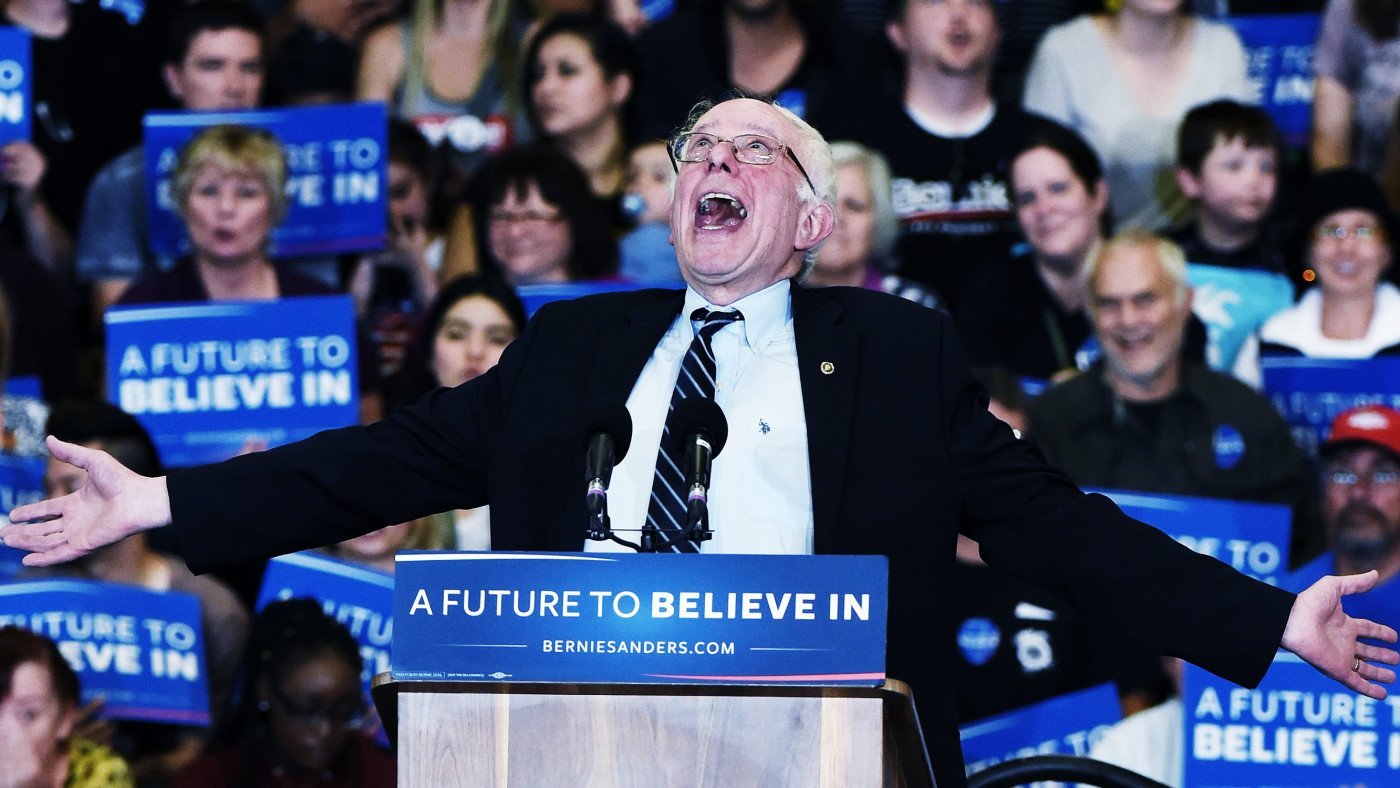This is a message to Bernie Sanders supporters. All of you – from Rosario Dawson and Susan Sarandon to the thousands of keyboard warriors out there on twitter who are “feeling the Bern” – listen up. Your candidate cannot win the Democratic nomination.
This is not gloating or wishful thinking. It is maths.
To win the nomination, a Democrat needs a total of 2,383 delegates. Hillary Clinton currently has 2,228, while Bernie Sanders is trailing behind with 1,454. In the remaining 10 primaries, including West Virginia today, there are only 859 delegates at stake. Clinton needs just 155 to win, while even if Sanders got 100 percent of the vote and took all of them, he would still be short. One of those states, California, has more than half the remaining delegates to award, and the latest polls show Clinton beating Sanders there by 7 points.
Then there are the superdelegates, the ones Sanders has been whining about recently. As I explained last week, these approximately 720 unpledged delegates are there to prevent the Democratic party having a Trump moment and ending up with a nominee who stands against the rest of the party. They are not there to block Bernie Sanders’ path to the nomination – they don’t need to. Yes, 523 have endorsed Clinton, with just 39 supporting Bernie so far. But Clinton is also winning in terms of pledged delegates, with 1,705 to Sanders’ 1,415.
That is a far bigger lead in pledged delegates then Barack Obama had over Hillary Clinton at any time during 2008.
By the way, Hillary Clinton is also winning the popular vote count by over 3 million votes.
Why is it important to hammer home these numbers? Because Bernie Sanders doesn’t seem to understand the maths. His campaign has ricocheted from ignoring the Democrats who voted for Clinton in the Southern states (the majority of whom were African-American), to acting shocked about how closed primaries work when he got hammered in New York, to complaining about the rules for the convention.
Here is Sanders’ latest gripe: there are not enough of his supporters on the committees for the convention. In a letter to DNC Chairwoman Debbie Wasserman Schultz, Sanders complains that only three of his recommendations made it onto standing committees, and implies this means the end result cannot be fair. In particular, he has some deeply insulting things to say about two of the chairs:
“As it stands now, the chairs of the Rules Committee [former Massachusetts Rep. Barney Frank] and the Platform Committee [Connecticut Gov. Dannel Malloy] are active supporters of Secretary Clinton’s campaign. But even more than that, they both are aggressive attack surrogates on the campaign trail. I do not, and the millions who have supported our campaign will not, have any confidence that either of them will conduct committee proceeding in an even-handed manner. In fact, the suggestion that they would be appropriate chairs in and of itself suggests the standing committees are being established in an overtly partisan way meant to exclude the input of the voters who have supported my candidacy.”
The idea that two Democratic party chairs would be incapable of putting personal preference aside and doing their jobs fairly is blatant projection. Sanders and his campaign staff cannot possibly imagine their supporters acting impartially, so they assume Clinton’s couldn’t either. The letter ignores the obvious point that, as a long-term Democrat and former Secretary of State, Clinton might be more deserving of support from the Democratic party than a proudly self-proclaimed Independent who has only recently decided to throw in his lot with the Democrats. She is, after all, the frontrunner. But in the mind of Bernie Sanders, there is only one possible explanation if he fails to walk out of the convention with the nomination: a rigged system and biased committees.
In his delusional state, Sanders’ final desperate ploy is to delegitimise Clinton’s inevitable victory, as he has tried to delegitimise the choices of her supporters and her ongoing success. His letter continues:
“If the process is set up to produce an unfair, one-sided result, we are prepared to mobilize our delegates to force as many votes as necessary to amend the platform and rules on the floor of the convention.”
That’s right. If the Senator from Vermont doesn’t get his way, he’s going to throw a tantrum on the convention floor and kick and scream until he gets the rules changed to his advantage. Because to do anything else just would be “unfair”.
Throughout the race, Sanders has failed to take any responsibility for his campaign’s shortcomings. He could have actively sought the support of African-American voters in the South – instead his wife suggested they just weren’t well-informed enough about Sanders, while his supporters attacked them for voting for Clinton. His campaign could have publicised New York’s closed primary and encouraged supporters to register in time to vote for him – instead he said nothing, then claimed afterwards it was an assault to democracy, despite having won six closed primaries previously. And in terms of superdelegates and committees, maybe if Sanders hadn’t made such an effort to alienate the mainstream Democratic party and refuse to support progressives in down-ballot races, he might be met with a warmer reception.
All this caterwauling cleverly obscures the key fact I opened with: Sanders can’t win. Hillary Clinton has the votes and the delegates. She doesn’t need biased committees to hand her the nomination – the Democratic voters across the country already did that for her. Even if the benches were stacked with Bernie fans waving “Political Revolution” flags, that wouldn’t change the numbers.
Bernie Sanders and his fans need to learn to count. But they also need a more important lesson: you can’t always have what you want be simply screaming “It’s not fair”.


